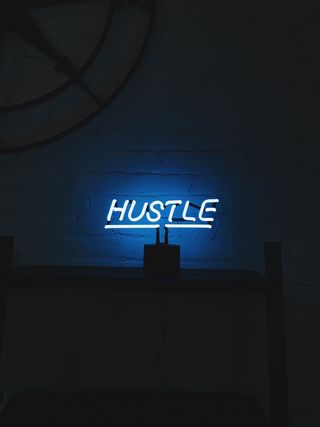Health
The 'Rise and Grind' of Hustle Culture
Your health and happiness depend on knowing if you're a card-carrying member.
Posted October 2, 2019 Reviewed by Jessica Schrader

Do you hit the ground running as soon as your feet touch the morning floor, checking electronic devices, slurping coffee, and stuffing a Danish in your mouth as you bolt out the door with a million ideas exploding in your head? Are you someone who sets short deadlines, overloads yourself with more than is humanly possible, and rushes at lightning speed moaning about the shortage of time? Do you create crises for everyone in your wake, wail at the clock and shake your fist at the heavens because there’s never enough time to do everything?
If the answer to any of these questions is yes, you could be a member of the hustle culture. Perhaps non-stop hustling makes you feel important. You have a lot on your plate, and you stand out from the masses because you're superhuman and can do it all.
Toil Glamour
The toil glamour of the hustle culture extols overworking and burnout and signals you're a hard, dedicated employee, and 45% of the workforce brag about being modern-day members. They bathe in the same glamorous light that advertisers poured over the cigarette and liquor ads of the 1930s. In movies and commercials back then, it was considered sexy to smoke and drink until they realized it caused cancer and stroke.
If you’ve fallen prey to the hustle culture, you have bought into the idea that it’s cool to be “always-on” and to push yourself to the max each of the 1,440 minutes of the day. You boast about no breaks. No leisure. No weekends off. No vacations. No sleep or exercise and practicing “gobble, gulp, and go” or skipping meals altogether. Not unlike the trendy practice in some circles of vaping—which has been linked to certain lung diseases and the damaging of blood vessels—if you’re a hustle culture member, studies show that you’re cutting your career short, slowly destroying your mental and physical health, and harming your relationships. And you may even die at an earlier age than your cohorts.
Driven: Living From Outside In
When the hustle culture drives you, you unwittingly relinquish your personal power and become a slave to internal and external pressures such as deadlines, work demands, or pleasing friends and loved ones. You grow so accustomed to being on autopilot that you’re not attuned to your surroundings or yourself. Perhaps you hit the ground hurrying and rushing from the moment you wake up, shaking your fist at the clock because there aren’t enough hours in the day. As you frantically and mindlessly toil on a project—concerned the boss won’t like the finished product or that you won’t meet the deadline—you’re out of your present mind, stuck in future worries or past regrets. These external and internal pressures backfire, undermine your ability, and create unnecessary stress and ultimately burnout.
Drawn: Living From Inside Out
When you’re drawn, you’re master instead of a slave to your daily life. You come from a centered, calm place that puts you in charge of your busy mind so you don’t succumb to external or internal pressures. You’re attuned to yourself and your surroundings in a calm, nonjudgmental way and focus on what’s happening right now. Anchored in the present moment, an inner barometer guides your life in a peaceful observing awareness of everything you do. Regardless of the circumstances, your self-talk is compassionate, supportive, and empowering.
The words you use can make you feel less pressured and more in charge of your life instead of at the mercy of it—could instead of should or want to or choose to instead of must or have to: “I can do my best to win that contract” or “I’m choosing how I want to handle that challenge.” You value “great work”—not simply doing a task to complete it or to produce a product but being in the process as you go through to completion. You’re a master of self-correction and live with integrity, admitting mistakes and fixing them. You focus on the opportunity nested in a career obstacle instead of the difficulty. You center yourself with eight “C” words: calm, clarity, confidence, curiosity, compassion, creativity, connectedness, and courage. The drawn state fosters mindful productivity in which you make conscious choices. Your ability to accept obstacles, difficulty, and disappointments with calm and clarity gives you the ability to scale them. Social scientists report that overworking without time away reduces productivity and increases work-related illness. Studies show that unplugging from the rat race boosts your productivity, creativity, and problem-solving abilities.
You Can Course-Correct
Anybody can be driven by the hustle culture. You’re not really cool, charming, or unique. It’s easy to work on autopilot. Anybody can do it. But when your well-being is at stake, you want to make "rise and shine" a priority over "rise and grind." The difficult—and more rewarding—part is to find that place inside where you’re drawn. Cultivating mindful productivity—instead of placing an intense focus on the completion of the task—enriches your work life. Every time you feel driven, choose more supportive, comforting words such as “I can,” “I want to,” or “I choose to.” Once you realize that you don’t have to live up to the hustle culture’s demands, you can take a breath, step back, and chill. And you become stronger, calmer, and more self-assured.
There are 1,440 minutes in one day. Five daily minutes in which you still your busy mind and center on the quiet places inside sets the compass of your heart so you can be more drawn, even in times of upheaval. And science shows it’s worth it. When you’re drawn, your heart and respiratory rates slow down. Muscles loosen. Your mind is calm, open, and clear. Decisions and actions are reflective, even, and balanced. You have better sleep, increased immunity, lower blood pressure, improved digestion, and a sense of well-being. Studies also show that a slower and calmer approach to job tasks results in more productivity, a higher quality product, and greater success in the long run.
Contemplate how much of your life is driven versus drawn. Then ask what actions you can take so you’re drawn from a deeper, personal calling instead of outside hustle pressures. May you find that place within yourself where daily actions and peace of mind coexist—where you have more idle moments to chill without imperatives, nothing to rush to, fix, or accomplish. And you’re able to relax into that sweet spot where you’re mindfully aware in each moment. It has been said that 2019 is the year of self-care. With the year more than half over, how do you think you're doing?


